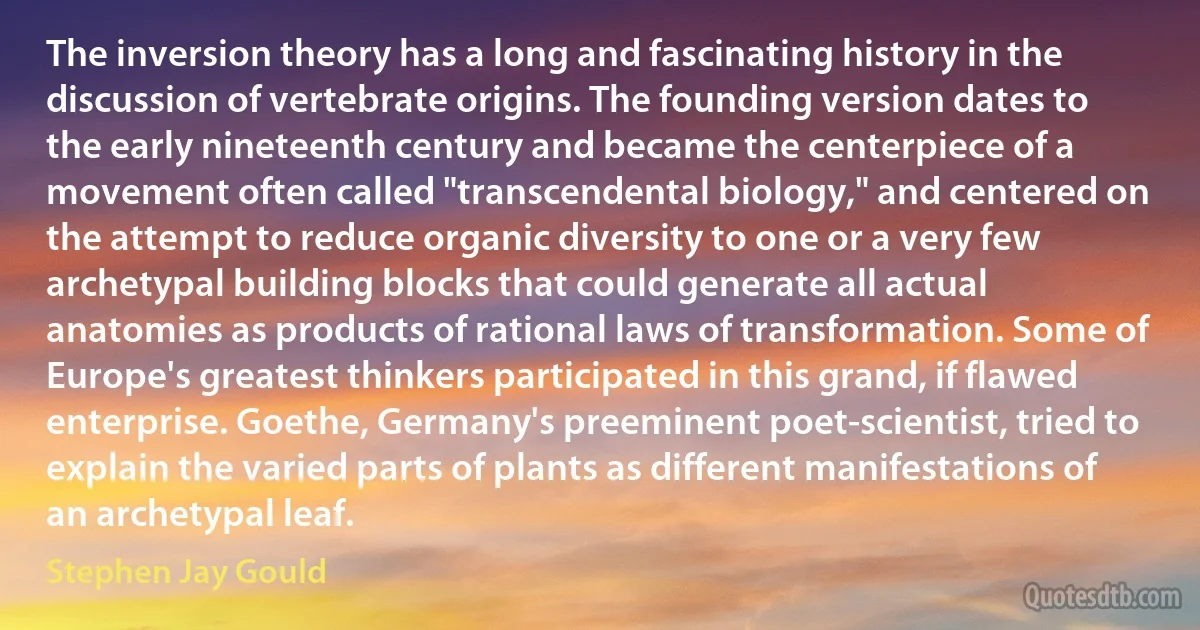
The inversion theory has a long and fascinating history in the discussion of vertebrate origins. The founding version dates to the early nineteenth century and became the centerpiece of a movement often called "transcendental biology," and centered on the attempt to reduce organic diversity to one or a very few archetypal building blocks that could generate all actual anatomies as products of rational laws of transformation. Some of Europe's greatest thinkers participated in this grand, if flawed enterprise. Goethe, Germany's preeminent poet-scientist, tried to explain the varied parts of plants as different manifestations of an archetypal leaf.
Stephen Jay GouldRelated topics
attempt biology building centerpiece century different early few founding history inversion leaf nineteenth organic transcendental transformation try version vertebrate goethe laws partsRelated quotes
Even when altruism is allowed (as, for example, in Gary Becker's model of rational allocation), it is assumed that the altruistic actions are undertaken because they promote each person's own interests; there are personal gains to the altruist's own welfare, thanks to sympathy for others. No role is given to any sense of commitment about behaving well or to pursuing some selfless objective. All this leaves out, on the one hand, the evil passions that early theorists of capitalism contrasted with self-interest and, on the other, the social commitments that Kant analyzed in The Critique of Practical Reason and that Adam Smith discussed in The Theory of Moral Sentiments.

Amartya Sen
The real struggle today, just as in the second quarter of the nineteenth century, is between a view of the world termed liberalism or radicalism, for which the primary object of government and of foreign policy is peace, freedom of trade and intercourse, and economic wealth and that other view, militarist or rather diplomatic, which thinks in terms of power, prestige, national or personal glory, the imposition of a culture and hereditary or racial prejudice. To the good English radical, the latter is so unreal, so crazy in its combination of futility and evil, that he is often in danger of forgetting or disbelieving its actual existence.

John Maynard Keynes
Philosophers might care to ask themselves ... how often they are accomplices in increasing the audience for a second-rate article simply because their introductory course needs a simple-minded version of a bad idea that even freshmen can refute. Some of the most frequently reprinted articles in twentieth-century philosophy are famous precisely because nobody believes them; everybody can see what's wrong with them. ... The confirmation of this claim is left as an exercise for the reader. Among the memes that structure the infosphere and hence affect the transmission of other memes are the laws of libel.

Daniel Dennett
Starting with the Minnesota twin study thirty-five years ago, and now with a mountain of data from twin, sibling, and adoption studies, we know that pretty much anything you can quantify about human personality, behavior, and intelligence is to some degree heritable, average-average at around the fifty percent level but sometimes much higher. We now in fact have a busy and exciting field of study called "behavioral genetics.” Given that all these traits are heritable, it follows from the ordinary laws of biology that different races will exhibit different statistical profiles on them. That's not astonishing, mysterious, or horrible: It's just first-floor-level science.

John Derbyshire
Some students of philosophy have unreasonably high expectations of the subject. They expect it to provide them with a complete and detailed picture of the human predicament. They think that philosophy will reveal to them the meaning of life, and explain to them every facet of our complex existences. Now, although studying philosophy can illuminate fundamental questions about our lives, it does not provide anything like a complete picture, if indeed there could be such a thing. Studying philosophy isn't an alternative to studying art, literature, history, psychology, anthropology, sociology, politics, and science.

Nigel Warburton
